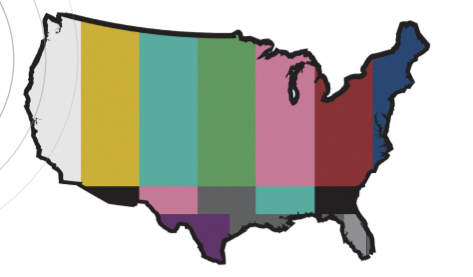Lost Signal: How Middle Eastern Networks Are Silenced in the U.S.
On October 7, 2001, a small, relatively new Arabic-speaking network based in Doha, Qatar, broadcast a short video of Osama bin Laden delivering an alarming message of destruction to the American people. In the aftermath of 9/11, the Bush administration attacked the network for airing the footage, accusing the station of harboring an Anti-American bias. The station, Al Jazeera, disregarded the recriminations and continued airing any bin Laden videos they received. The American government quickly reputed Al Jazeera as al-Qaeda's mouthpiece.
So when Al Jazeera created its English speaking sister channel (AJE) in 2006, it's no surprise that the station was only picked up by a handful of local cable networks in the U.S.
The network's absence in the U.S. is sad and, quite frankly, embarrassing for a country that prides itself on being the model for freedom of press. Suffering from a mixture of xenophobia, Islamophobia, and fear that bin Laden's recordings held coded messages for his imprisoned terrorists (thank you, Condoleezza Rice), the U.S. successfully ignored one of the most powerful news networks in the world.
"It's truly a disservice and a stupid decision on the part of the U.S. government," commented Professor Mehrzad Boroujerdi, Director of the Middle Eastern Studies program at SU. "Their coverage of international news is far, far superior to anything we have."
Since 2006, AJE has grown to reach over 220 million homes and is accessible in more than 100 countries, including every major European market. As the first and only English-speaking network in the Middle East, it serves as a local voice with a global reach. The network's stated objective, "to give voice to untold stories, promote debate, and challenge established perception," exemplifies the ultimate goal for journalists.
Meanwhile, we Americans remained satisfied with our talking heads and celebritized reporters, denying that xenophobia played a role in our refusal to air the network.
"I have a satellite dish at my house, and I stopped watching CNN, FOX and all those networks because I didn't want to be wasting my time when AJE's conducting an interview with a Somali pirate," said Professor Boroujerdi. "Something like that would never be aired on our networks."
This past spring, when revolutions broke throughout the Middle East, AJE was no longer ignorable. The station's up-close coverage has received immense praise for its aggressive and unparalleled reporting. The Egyptian protests—the 17-day revolution that ignited the uprisings known as the Arab Spring—placed the international spotlight on AJE's around the clock coverage.
With six Middle Eastern bureaus (Doha, Beirut, Gaza, Ramallah, Tehran and Cairo), AJE's reporters broadcast their first stories of the uprisings, while American networks fumbled getting their correspondents overseas. It was only then, that the American public took notice.
A New York Times article published on January 31—six days after the first indications of unrest—reported that traffic to AJE's website had increased 2,500 percent since January 29. The article's reporter, Brian Stetler, spoke with the head of AJE online, Mohamed Nanabhay, who stated that of the 4 million views the live stream had received since the 29, 1.6 million came from the United States.
With the network finally receiving the recognition it deserves, we can hope the major cable companies will catch on as well. On August 1, TimeWarner Cable and Verizon FiOS began carrying the channel for New York City subscribers. Recent news reports that beginning on October 31, Chicago will also air the network for two 30-minute time slots, six days a week on public television station WWTW-TV Channel 11 and WTTW Prime, respectively.
Unfortunately, it took chaos for us to finally notice what our past administration worked to ignore. Even more bizzare is that xenophobia was never used to describe the suspicious atmosphere of our society. It's discouraging that such an enviornment hindered our country's access to a medium that could have drastically altered the conversation.
Even so, there's no acceptable excuse as to why AJE landed a spot on America's blacklist. Nothing, not even a platform of Anti-Americanism, should have dissuaded cable companies against carrying the network.
For a country so willing to uphold the first amendment, freedom of speech must apply to all—especially when so many are willing to listen.

